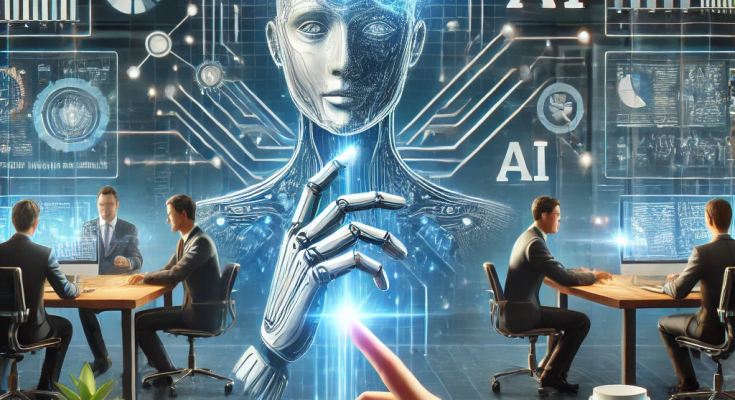Introduction
Artificial Intelligence (AI) is transforming the business world at an unprecedented pace, and at the forefront of this revolution is Generative AI—a technology capable of creating text, images, videos, code, and even entire business strategies.
From automating repetitive tasks to personalizing customer experiences, Generative AI is helping companies boost efficiency, cut costs, and unlock new levels of creativity. Industry leaders across technology, healthcare, finance, and e-commerce are rapidly integrating AI-powered solutions to gain a competitive edge.
This article explores how businesses are leveraging Generative AI, the key benefits and challenges, and the future of AI-driven innovation.
What is Generative AI?
Generative AI refers to artificial intelligence models—like ChatGPT, DALL·E, and Gemini—that can generate human-like content, design products, and even code software.
Unlike traditional AI, which follows pre-programmed rules, Generative AI learns from vast amounts of data, allowing it to:
• Create new text, images, videos, and audio
• Generate personalized content for marketing and advertising
• Write and debug complex code
• Develop business strategies and automate decision-making
By harnessing machine learning and deep learning algorithms, Generative AI is redefining how businesses operate.
How Businesses Are Using Generative AI
1. Content Creation and Marketing Automation
Companies in media, advertising, and digital marketing are using Generative AI to automate content production, including:
• AI-generated blog posts, product descriptions, and social media content
• Automated video editing and image creation
• Personalized email marketing campaigns based on user behavior
💡 Example: Coca-Cola recently launched an AI-powered marketing campaign that generates customized ad visuals using Generative AI, enhancing brand engagement.
2. AI-Powered Customer Service and Chatbots
Customer service teams are integrating AI chatbots and virtual assistants to:
• Provide instant responses to customer queries
• Automate support ticket handling
• Offer 24/7 assistance without human intervention
💡 Example: E-commerce giants like Amazon and Shopify use AI-powered customer support bots to resolve common issues and improve response times.
3. Software Development and AI-Generated Code
Tech companies and startups are leveraging Generative AI to assist software developers in:
• Writing and debugging code faster
• Generating scripts for automation and data analysis
• Creating prototypes for new applications
💡 Example: GitHub Copilot, powered by OpenAI’s Codex, helps developers write code more efficiently by suggesting entire lines or functions based on natural language prompts.
4. AI in Healthcare: Drug Discovery and Medical Diagnostics
The healthcare industry is using Generative AI to revolutionize medical research by:
• Identifying new drug compounds faster
• Predicting disease patterns and patient outcomes
• Generating medical imaging reports and diagnostics
💡 Example: AI-driven companies like DeepMind and Insilico Medicine use AI models to discover new drugs and improve treatment strategies for diseases like cancer and Alzheimer’s.
5. Financial Services: Fraud Detection and Risk Assessment
Banks and financial institutions are utilizing Generative AI to enhance security and risk management by:
• Detecting fraudulent transactions in real-time
• Analyzing financial trends for better investment strategies
• Automating loan approvals and credit risk assessments
💡 Example: JPMorgan Chase uses AI algorithms to detect suspicious transactions and prevent fraud, saving millions in potential losses.
6. AI in E-Commerce: Personalized Shopping Experiences
Online retailers are leveraging Generative AI to create hyper-personalized shopping experiences, such as:
• AI-driven product recommendations based on browsing history
• Personalized virtual shopping assistants
• Automated pricing and inventory management
💡 Example: Fashion brands like Nike and H&M use AI to recommend clothing styles based on customers’ previous purchases and preferences.
Benefits of Generative AI for Businesses
✅ Increased Productivity: AI can automate repetitive tasks, allowing human employees to focus on higher-value work.
✅ Cost Reduction: Companies can save money by reducing manual labor costs and streamlining operations.
✅ Faster Decision-Making: AI can analyze data and generate reports instantly, helping businesses make smarter choices.
✅ Enhanced Creativity: Generative AI augments human creativity by offering new perspectives, ideas, and designs.
✅ Scalability: AI-driven automation allows businesses to scale operations without significantly increasing resources.
Challenges and Ethical Concerns
Despite its advantages, Generative AI comes with risks and challenges, including:
⚠️ Bias and Misinformation – AI-generated content may contain biases based on training data.
⚠️ Intellectual Property Issues – Legal concerns arise over AI-generated content ownership and copyrights.
⚠️ Job Displacement – Automation may replace certain jobs, requiring workforce reskilling.
⚠️ Security Risks – AI-generated phishing scams and deepfakes pose new cybersecurity threats.
To mitigate these risks, businesses must adopt AI governance frameworks and ethical guidelines.
The Future of Generative AI in Business
🔮 AI-Powered Leadership & Decision-Making – Future AI models will assist executives in strategic planning and predictive analytics.
🔮 Hyper-Personalized Customer Experiences – AI will continue evolving to offer real-time personalization in every industry.
🔮 AI-Generated Products & Services – Businesses may develop AI-created intellectual property, from music to product designs.
🔮 Stronger AI Regulations & Compliance – Governments will implement stricter AI laws to ensure transparency and accountability.
As AI continues to advance, companies that adopt AI early and ethically will gain a competitive advantage in the digital economy.
Generative AI is revolutionizing the business landscape, driving innovation, efficiency, and personalized experiences across industries.
Key Takeaways:
• Businesses are integrating AI in content creation, customer service, finance, healthcare, and e-commerce.
• Generative AI boosts productivity, enhances decision-making, and reduces costs.
• Challenges like bias, security risks, and job displacement must be addressed with ethical AI policies.
• The future of AI will focus on hyper-personalization, automation, and AI-driven leadership.
Companies that embrace AI strategically will unlock new opportunities and shape the future of business.


